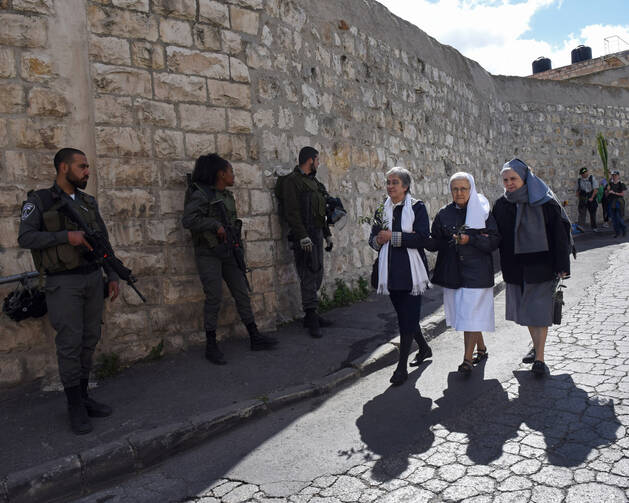Christian churches have a responsibility to work to bring the chronic conflict in the Middle East to a just peace, and more effective advocacy is needed in the United States, said church leaders meeting in Atlanta.
Nearly 40 heads of Christian churches and church-related organizations in the U.S. and the Holy Land adopted a four-page document, "Pursuing Peace and Strengthening Presence: The Atlanta Summit of Churches in the USA and the Holy Land," after an April 19-20 meeting at the Carter Center in Atlanta.
"We believe that working toward a just and lasting solution to the Palestinian-Israeli conflict would ... also promote peace in the Middle East region in general," the document said.
"We affirm that the two-state solution, built on the basis of international resolutions, in which both Israelis and Palestinians can live in neighborly relations and at peace with each other, must be viable politically, geographically, economically and socially," it said.
The church leaders said they would "urge the U.S. administration, Congress, politicians and public figures to adopt balanced and just positions that would pave the way for ... a just and enduring solution of the conflict."
Catholic participants included Latin Patriarch Fouad Twal of Jerusalem; Bishop Oscar Cantu of Las Cruces, New Mexico, chairman of the U.S. Conference of Catholic Bishops' Committee on International Justice and Peace; Stephen Colecchi, director of the USCCB Office of International Justice and Peace; and Michael La Civita, communications director of the New York-based Catholic Near East Welfare Association.
With more than 1 million U.S. Christians represented at the meeting, there is "a potentially powerful force that could shape U.S. policy" in the Middle East, La Civita told Catholic News Service after the meeting.
"When confronted with an existential threat, church leaders are united in purpose," he said, noting that the meeting was historic for several reasons, including that it brought together the "disparate elements of the church of Jerusalem: Catholic, Evangelical, Orthodox and Protestant."
The meeting aimed "to express our ecumenical unity in action toward the end of occupation and a lasting political solution in the Holy Land," the document said.
The church leaders said the "continuing expansion of illegal Israeli settlements on Palestinian lands" is a major threat to peace and must end.
Noting that the Holy Land is the spiritual homeland for the world's Christians, they said that "Christians everywhere are called to prayer and action" for its healing.
Peace with justice "requires ending the long conflict, occupation, injustice and all acts of violence and terrorism and bringing back the land we call holy to wholeness, peace, redemption and reconciliation for all of its inhabitants," they said.
Freedom of worship in Jerusalem, which is "sacred for Judaism, Christianity and Islam," must be protected, they added.
Churches and church-related organizations need to work together to "protect the existing and future presence of Palestinian Christians in the Holy Land," it said.
The church leaders said they would "educate the members of our congregations on the necessity and merits of a peace process that would result in fulfilling the right of Palestinians to self-determination and to their own independent state as well as the rights of all people and nations in the region, including Israel, to live in security and peace."
The churches intend to strengthen initiatives with U.S. faith-based groups that would "provide substantive input to the political process of making peace between Palestinians and Israelis," the document said.
As well as providing humanitarian assistance to all people in need in the Holy Land, the church leaders said they would support "the solidarity that is being demonstrated among some Christians, Jews, and Muslims—and some of the leaders of these communities in the Holy Land—especially in addressing humanitarian needs, fighting poverty, and fostering peace."
They said they would work to "find appropriate ways to exert economic leverage on commercial and governmental actors to end unfair and unjust practices and policies" that violate international laws and conventions. They also said they would work to support development in Palestine through social and economic investment, "thus witnessing to our commitment to operate at the intersection of faith and finance."








